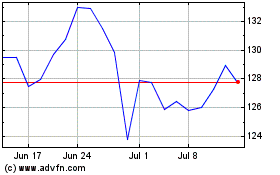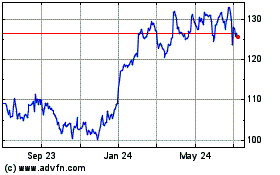By Peter Loftus and Austen Hufford
Merck & Co. posted an unexpected increase in second-quarter
revenue thanks to new cancer and hepatitis treatments, and an
increased profit versus a year-earlier period that was weighed down
by foreign-exchange losses.
The drugmaker also tightened its full-year 2016 financial
forecast, which was mostly in-line with analyst forecasts.
Merck is trying to return to consistent sales growth after
several years of declines, as older drugs have lost sales to
generic competition. The company is aiming to replace the lost
revenue with sales from new products such as the cancer
immunotherapy Keytruda and hepatitis C treatment Zepatier, and has
cut costs in an effort to bolster profits.
But some analysts see a tough road ahead for Merck. Keytruda
faces a strong competitor in Bristol-Myers Squibb Co.'s Opdivo
cancer immunotherapy, which has generated higher sales. And Merck
faces sales declines in coming years for top drugs including
cholesterol treatments Vytorin and Zetia, due to generic
competition, said Credit Suisse analyst Vamil Divan.
For the quarter, the company posted a profit of $1.21 billion,
up 75% from $687 million a year earlier, when Merck took a $715
million charge to devalue its assets in inflation-plagued
Venezuela. Earnings rose to 43 cents a share from 24 cents a
share.
Excluding restructuring and acquisition-related costs, per-share
earnings rose to 93 cents from 86 cents. Analysts polled by Thomson
Reuters had forecast per-share earnings of 91 cents a share on
revenue of $9.78 billion.
Sales grew 0.6% to $9.84 billion.
Merck's pharmaceutical revenue increased 1.6% to $8.7 billion
for the second quarter, driven by growth in cancer treatments,
hospital acute care, cardiovascular treatments and vaccines.
Keytruda, which treats melanoma and lung cancer, posted sales of
$314 million in the most recent quarter, compared with $110 million
in the same quarter last year. Merck is continuing to develop and
launch the drug for different types of cancers; its Keytruda
development program includes 30 tumor types across more than 300
clinical trials.
Merck is trying to expand the use of Keytruda to include newly
diagnosed lung-cancer patients -- a large market. Merck plans to
release full details in the coming months of a study in which
Keytruda prolonged survival in such patients, compared with
chemotherapy.
"My sense is that these data are quite strong and potentially
practice-changing in first-line lung cancer," Merck's head of
research, Roger Perlmutter, said in an interview Friday.
In January, the U.S. Food and Drug Administration approved
Merck's new treatment, Zepatier, for hepatitis C, the latest
entrant in a booming market for drugs for the viral infection -- a
market now dominated by Gilead Sciences Inc. Zepatier had sales of
$112 million, compared with $50 million in the first quarter.
Much of Zepatier's sales so far have come from Merck's contract
with the U.S. Department of Veterans Affairs' health-care division,
Adam Schechter, head of Merck's pharmaceutical unit, said in an
interview.
Sales of allergy treatment Nasonex fell 53% in the first quarter
from the year prior. A generic version of the drug became available
in the U.S. in March, and the company has said it expects
significant losses in future sales.
Sales of Remicade, a treatment for inflammatory diseases,
decreased 26% because of a loss of exclusivity and the accelerating
impact of competition from lower-cost copies, known as biosimilars,
primarily in Europe.
Combined sales of Type 2 diabetes treatments Januvia and Janumet
increased 2%, while combined sales of cardiovascular drugs Zetia
and Vytorin grew 4% on price increases.
Antibiotic Cubicin posted 22% sales growth to $357 million on
price increases, but Merck said it had lost patent protection in
June and that it expects a significant decline in sales.
HPV vaccines Gardasil and Gardasil 9 fell 8% to $393 million due
to the timing of public sector purchases.
Earlier this month, Merck said it planned to lay off
research-and-development workers at three East Coast sites in a
shake-up of its early-stage drug-hunting efforts. At the same time,
Merck plans to start new laboratories in Cambridge, Mass., and the
San Francisco Bay Area, as part of a trend among large drugmakers
to try to tap into hot clusters of biotechnology startup activity
and academic research.
For the year, Merck now projects per-share adjusted earnings
between $3.67 and $3.77 on revenue between $39.1 billion and $40.1
billion. Analysts had expected adjusted earnings of $3.72 a share
on revenue of $39.49 billion.
Shares, which have risen 7% in the last three months, increased
0.5% in recent trading.
Write to Peter Loftus at peter.loftus@wsj.com and Austen Hufford
at austen.hufford@wsj.com
(END) Dow Jones Newswires
July 29, 2016 13:32 ET (17:32 GMT)
Copyright (c) 2016 Dow Jones & Company, Inc.
Merck (NYSE:MRK)
Historical Stock Chart
From Mar 2024 to Apr 2024

Merck (NYSE:MRK)
Historical Stock Chart
From Apr 2023 to Apr 2024
